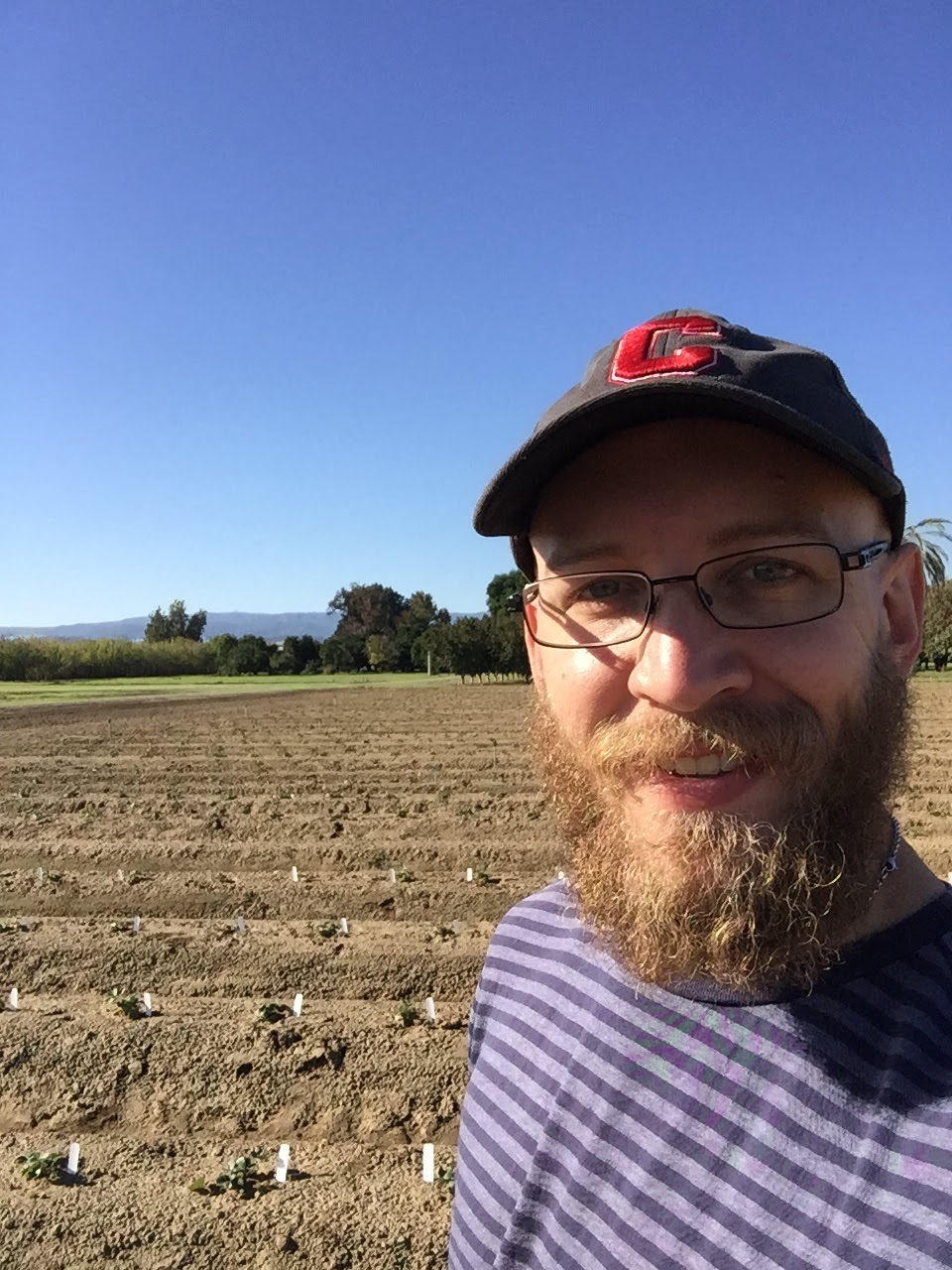
|
Mitchell Feldmann – Ph.D. expected 2019Thesis: Modernizing the Breeding Mechanics of StrawberryPI: Steve KnappMitchell is a Ph.D. student and is deeply interested in the quantitative, population, and evolutionary genetics of fruit quality in strawberry (e.g. color, shape, size, and flavor). He is helping the improvement of strawberry by gaining a deeper understanding of the genetics controlling critically important composite traits. His research is specifically aimed at the development and deployment of novel, fruit phenotyping strategies and genome enables selection and prediction. Mitchell was featured in the January 2018 newsletter. |
|
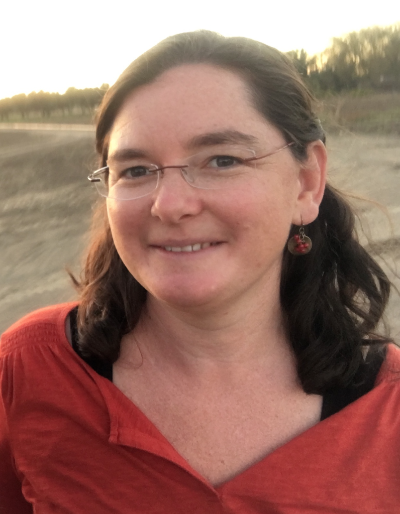
|
Rachel Frank-GreenhutThesis: Phenotypic and genetic variation in spinach germplasm related to cadmium accumulationPI: Charlie Brummer and Allen Van DeynzeRachel is a second-year master’s student in the Horticulture and Agronomy Graduate Group at UC Davis, working under Drs. Charlie Brummer and Allen Van Deynze in their spinach breeding program. She aspires to become a vegetable breeder. Through her coursework in the Horticulture and Agronomy Graduate Group, she is developing a solid foundation in research perspectives, horticultural principles and practices, experimental design and statistical analysis, population and qualitative genetics, and plant breeding. Her project entails screening diverse accessions from international spinach germplasm collections for variation in cadmium accumulation, identification of candidate cadmium regulation genes, and genotyping screened accessions for alleles in candidate genes associated with reduced cadmium. She is also assisting with designing a target enrichment genotyping platform for use in the breeding program. Rachel was featured in the November 2017 newsletter. |
|
|
|
Kimberly Gibson – Ph.D. expected 2021PI: Paul GeptsKimberly Gibson is the leader of the SCOPE Lima Bean Team and a PhD student in the Gepts Lab where she studies the biochemical defense mechanisms of Lima bean against herbivory by the insect pest, Lygus hesperus. Kimberly is currently working on breeding lygus-tolerant, large-seeded, bush Limas for conventional and organic systems. Prior to starting her doctoral studies at UC Davis, Kimberly worked for Centro de Educación Ambiental de la Península Yucateca in México and for Robert Galvin, Inc. in San Francisco. She holds a BA with honors in Urban Studies from Stanford University. Kimberly was featured in the October 2017 newsletter. |
|
|
Priscilla Glenn – Ph.D. expected 2021PI: Jorge DubcovskyMy name is Priscilla Glenn. I am a first year PhD student at the University of California at Davis (UCD) under Dr. Dubcovsky. I am from Pflugerville, Texas and chose to pursue plant breeding/horticulture due to an initial interest in genetics. When exploring deeper into genetics, plants caught my attention and have held it ever since. I am a member of the WheatCAP project at UCD as well as a member of the NSF Graduate Research Fellowship Program. My personal project includes studying the determination of spikelet number within wheat on chromosome 7AS . My future career goal is to enter the plant breeding industry and pursue a career in crop improvement. |
|
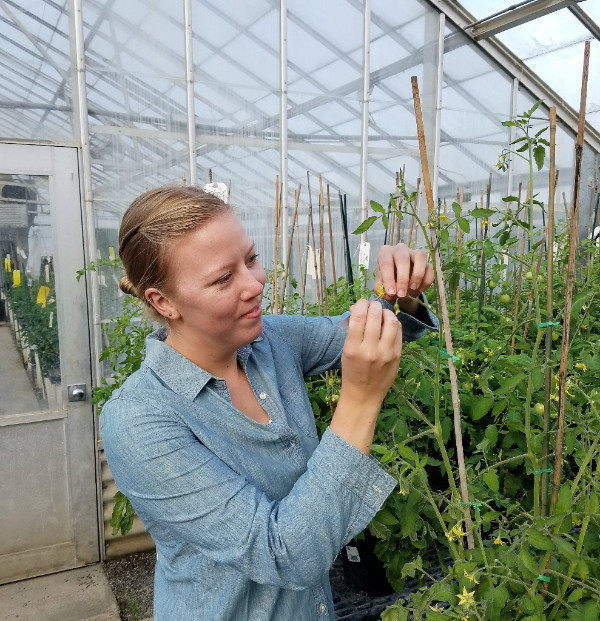
|
Amy GrohThesis: Water stress tolerance traits in wild species of tomatoPI: Dina St. ClairAmy is a second year graduate student in Horticulture and Agronomy, pursuing a PhD. She works in Dr. Dina St. Clair’s lab studying water stress tolerance in tomatoes. During her time at UC Davis, she has been working on many projects, all centered around understanding the genetics of water stress tolerance traits in wild species of tomato so that we can eventually integrate these traits into cultivated tomato. She is currently working on crossing lines of tomatoes containing introgressions from two different wild species. In the future she would like to be a commercial breeder or work for the USDA making molecular tools that can be used for breeding. She is looking forward to a rewarding career where she will be contributing to improved crops that will impact the lives of growers and consumers directly. Amy was featured in the December 2017 newsletter. |
|
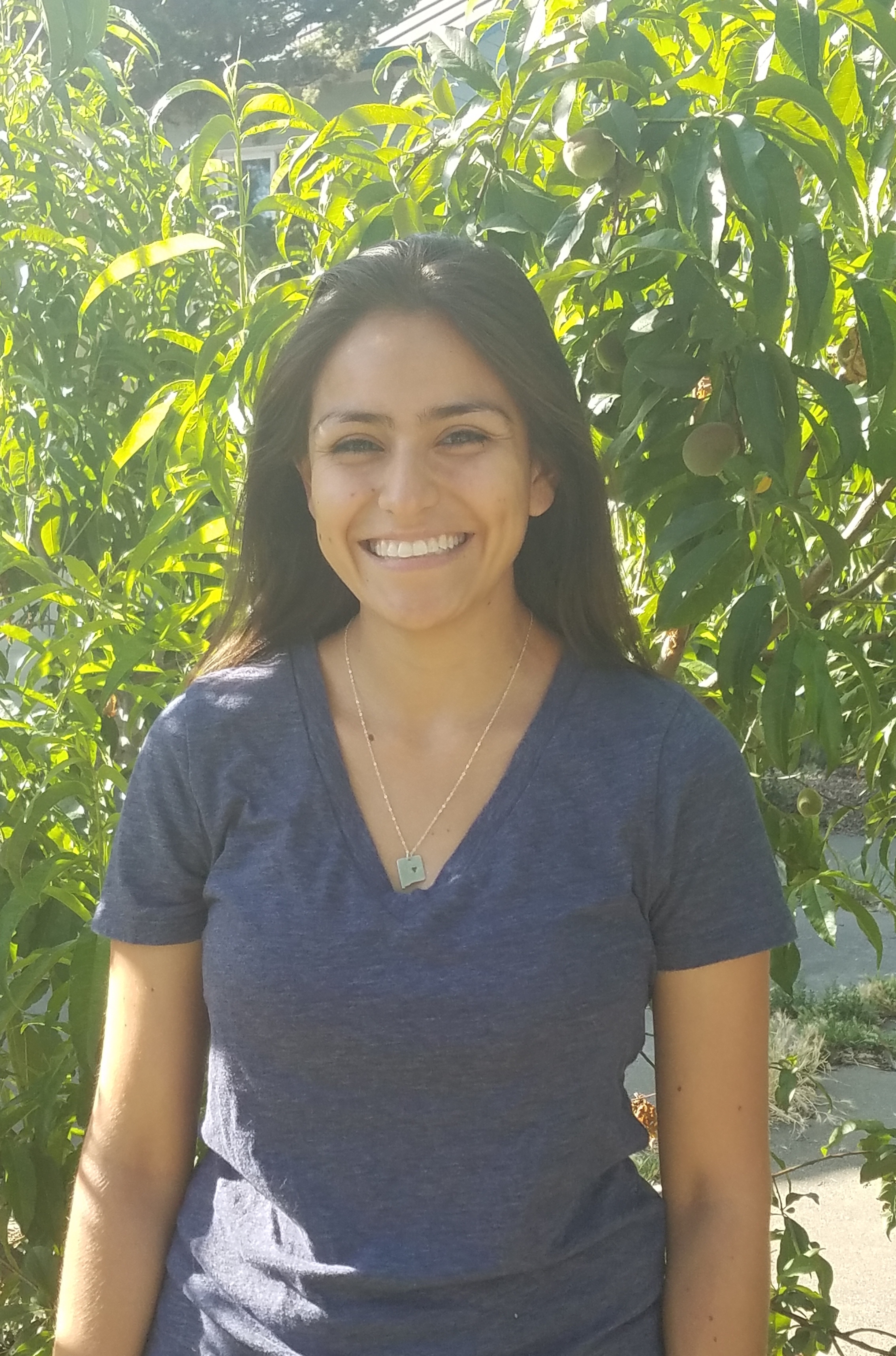 |
Samantha Hilborn – M.S. StudentPI: Charles Brummer, Allen Van DeynzeSamantha Hilborn, Graduate Student Researcher, received her B.S. in horticulture from New Mexico State University in 2017. Currently, she is working on her M.S. in horticulture under Allen Van Deynze and Charlie Brummer, focusing on genetic resistance to downy mildew in spinach. |
|
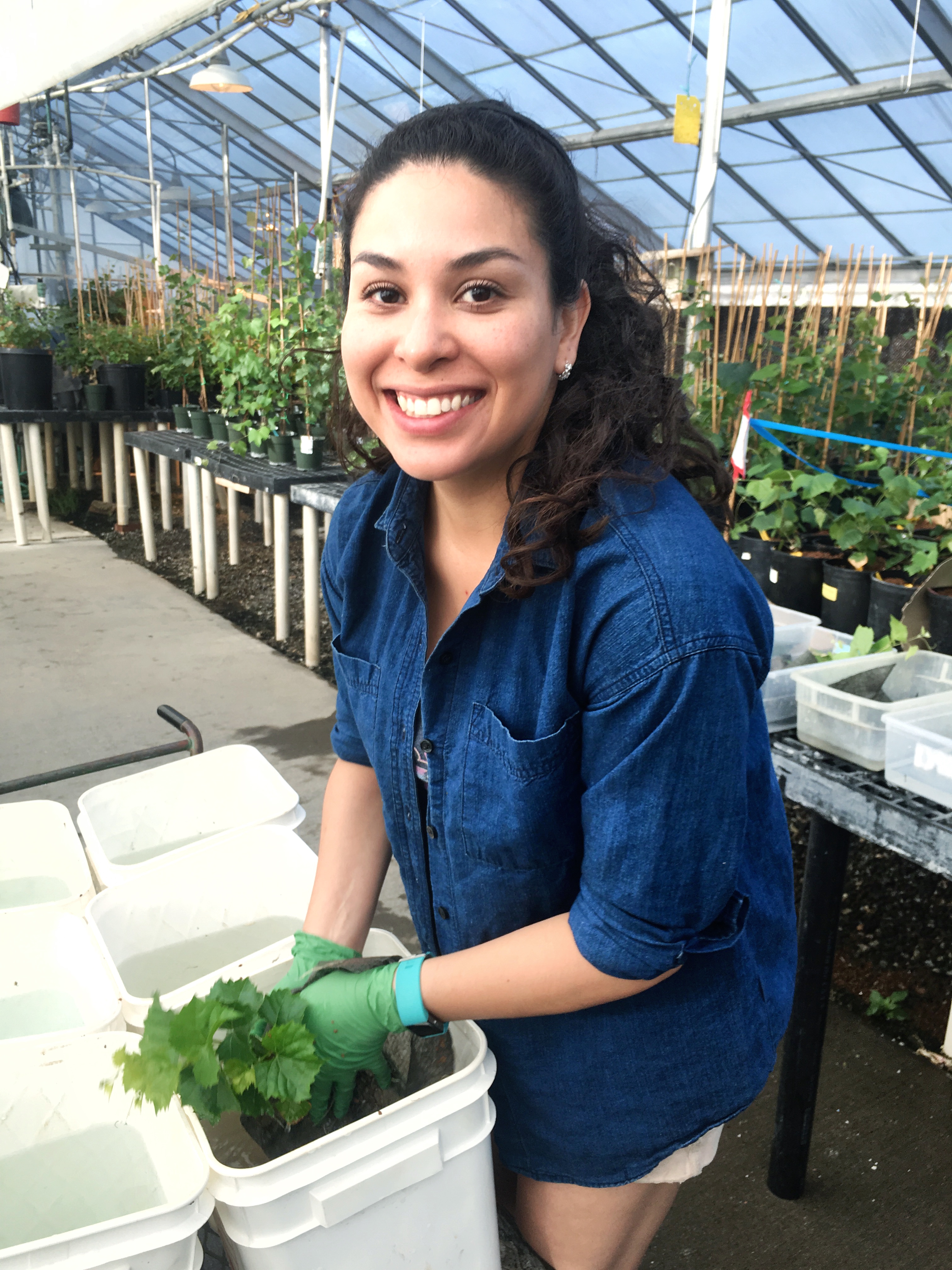
|
Karla Huerta – Ph.D. expected 2019Thesis: Characterization of novel sources of resistance to Pierce’s Disease in grapePI: Andrew WalkerI am a third-year graduate student in Dr. Andrew Walker’s Lab in the Department of Viticulture and Enology. I am part of the Pierce’s Disease (PD) Resistant wine grape breeding program. My research focuses in finding new sources of PD resistance to achieve long-term and broad resistance in our breeding program. Also, I study the genetic diversity of wild grapevines from Northern and Central Mexico. Apart from plant breeding, evolution and plant genetics, my interest lay in science communication, outreach and education. |
|
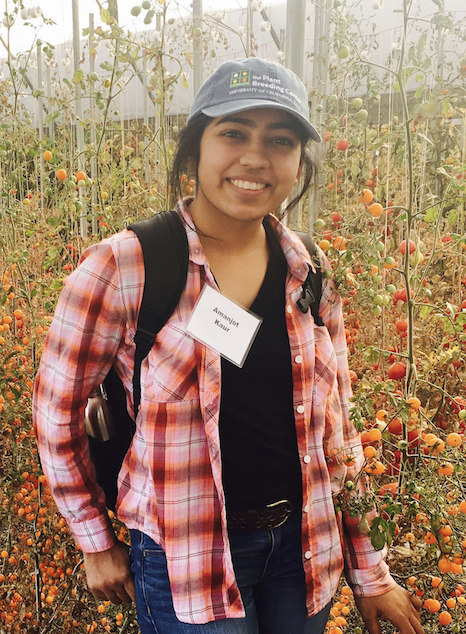 |
Amanjot Kaur – M.S. expected 2018Thesis: Evaluating a Hand-Held Near-Infrared Reflectance (NIR) Device as a High-Throughput Phenotyping Tool for Tomato and Pepper BreedingPI: Dina St. ClairBorn and raised in a small rural town of Panjab, India, Kaur immigrated to the Central Valley with her family at the age of 13. Partaking in the Future Farmers of America (FFA) during her high school education kindled her passion for agriculture, plants and leadership which led her to obtain her undergraduate degree in Biotechnology (emphasis in Plants) at UC Davis (Class of 2016). She is currently a second year Masters student working on a collaborative project between plant breeding, agricultural engineering and post harvest biochemistry in vegetable crops (specifically, tomatoes and peppers). Her work involves developing, calibrating and validating statistical chemometric models with existing spectrophotometric technology on fruits to assess their use as in-field plant high-throughput phenotyping tools for tomato and pepper breeding. She works with genetically diverse introgression lines of tomatoes developed at UC Davis as well as diverse cultivars of peppers from New Mexico State University. |
|
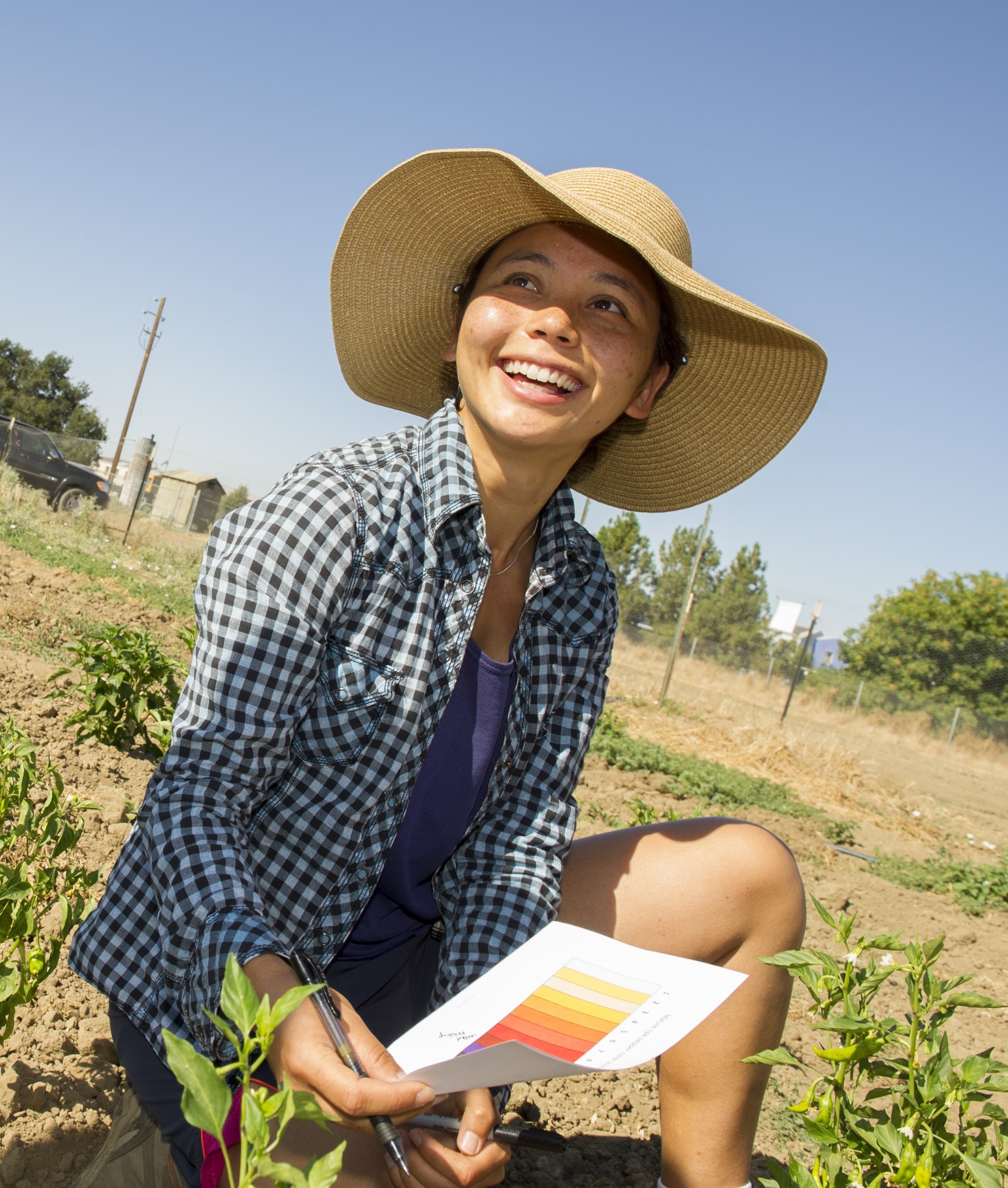 |
Saarah Kuzay – Ph.D. expected 2020Thesis: Identification, Mapping, and Characterization of QTL for Spikelets per Spike in Bread Wheat (Triticum aestivum L.)PI: Jorge DubcovskyResearch for her PhD under Jorge Dubcovsky focuses on understanding the genetic basis of the number of spikelets per spike (SPS) in wheat, a yield component trait for pasta and bread wheat. More specifically, she is using positional cloning to dissect the quantitative trait loci for number of spikelets per spike (SPS) located on chromosome arm 7AL (160-165 Mb). Ultimately, she hopes to use positional cloning to isolate this gene for SPS and deploy it in the UC Davis and CYMMIT wheat breeding programs. Outside of her thesis research, she is also working with SCOPE (Student Collaborative Organic Plant-Breeding and Education) to breed jalapeño and bell peppers for organic farming systems under Allen Van Deynze and Charles Brummer. |
|
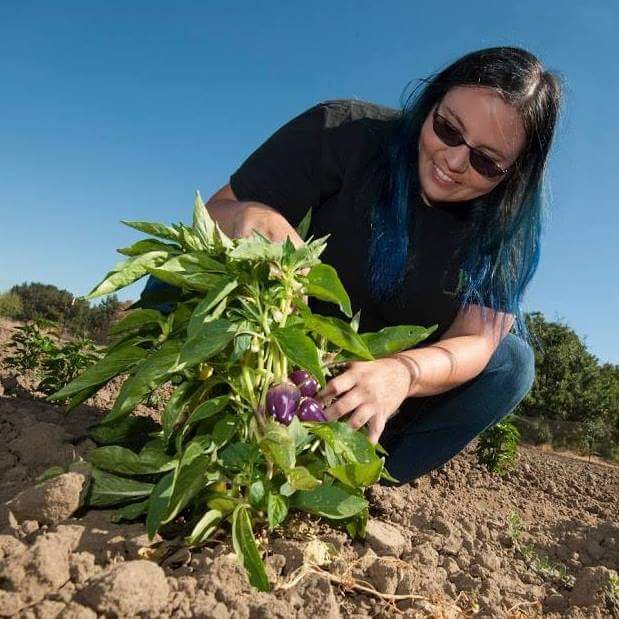
|
Randi Jimenez – Ph.D. expected 2018Thesis: Utilizing wild capsicum for breeding Curtovirus resistance in hot pepperPI: Allen Van DeynzeRandi has always been interested in plants. When she was a little girl she wanted to grow up to be a florist. Now, she is studying to be a plant breeder. She has worked with all kinds of crops from Monterey pine and strawberry to tomato and pepper. Her current breeding projects involve breeding hot peppers for virus resistance, as well as the SCOPE project where she is involved with the pepper breeding team. Randi was featured in the student spotlight December 2014 newsletter. |
|
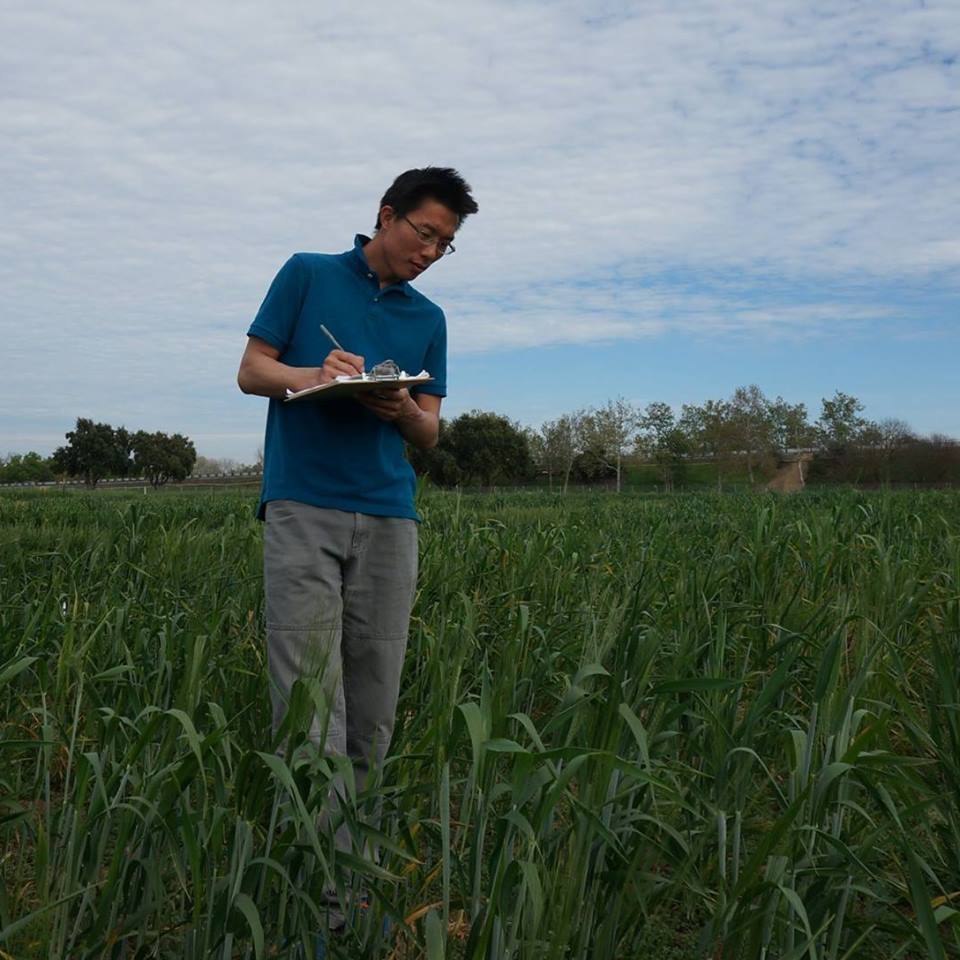
|
Youngjun MoPI: Jorge DubcovskyYoungjun is a fourth year PhD student in Horticulture & Agronomy Graduate Group conducting wheat genetics research in Dr. Jorge Dubcovsky’s laboratory. During his undergraduate years at Seoul National University, South Korea, he was interested in finding solutions for food security problems and wanted to pursue applied research that directly improves farmers’ lives. The Dubcovsky lab has been elucidating the molecular genetic mechanisms underlying important traits in wheat, such as flowering and disease resistance, by identifying novel genes and their functions and interactions with the environment. For his dissertation, he is studying the genetic basis controlling wheat plant height, an important agronomic trait affecting crop productivity. With a long-term goal of identifying novel genes and alleles that can be used to fine-tune wheat plant height, he has been enjoying learning various genetics approaches, including traditional bi-parental mapping, genome-wide association studies, and mapping by exome sequencing. Youngjun was featured in the June 2017 newsletter. |
|
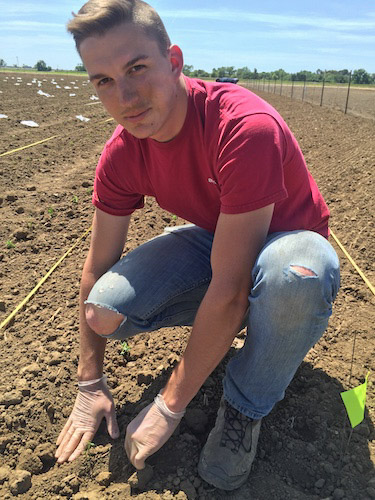
|
Scott NewellPI: Charlie BrummerScott Newell is a second year Master’s student in horticulture and agronomy. His studies focus on alfalfa breeding and genetics. Prior to his studies at UC Davis, I received my Bachelor of Science in Agronomy from Iowa State University in Ames, Iowa. Coming to Iowa State with a plan of study and a bit of hard work, he completed his bachelor’s degree in three years, starting his Master’s degree at UC Davis at 20 years old. His research work at Davis is focused on alfalfa, his main crop of interest. Scott's Master’s degree focuses on the standard testing procedure for fall dormancy evaluation in alfalfa. He has already started much of the work that will hopefully become his Ph.D. Upon completion of his degrees at UC Davis, he hopes to continue working with alfalfa. Scott was featured in the May 2017 newsletter. |
|
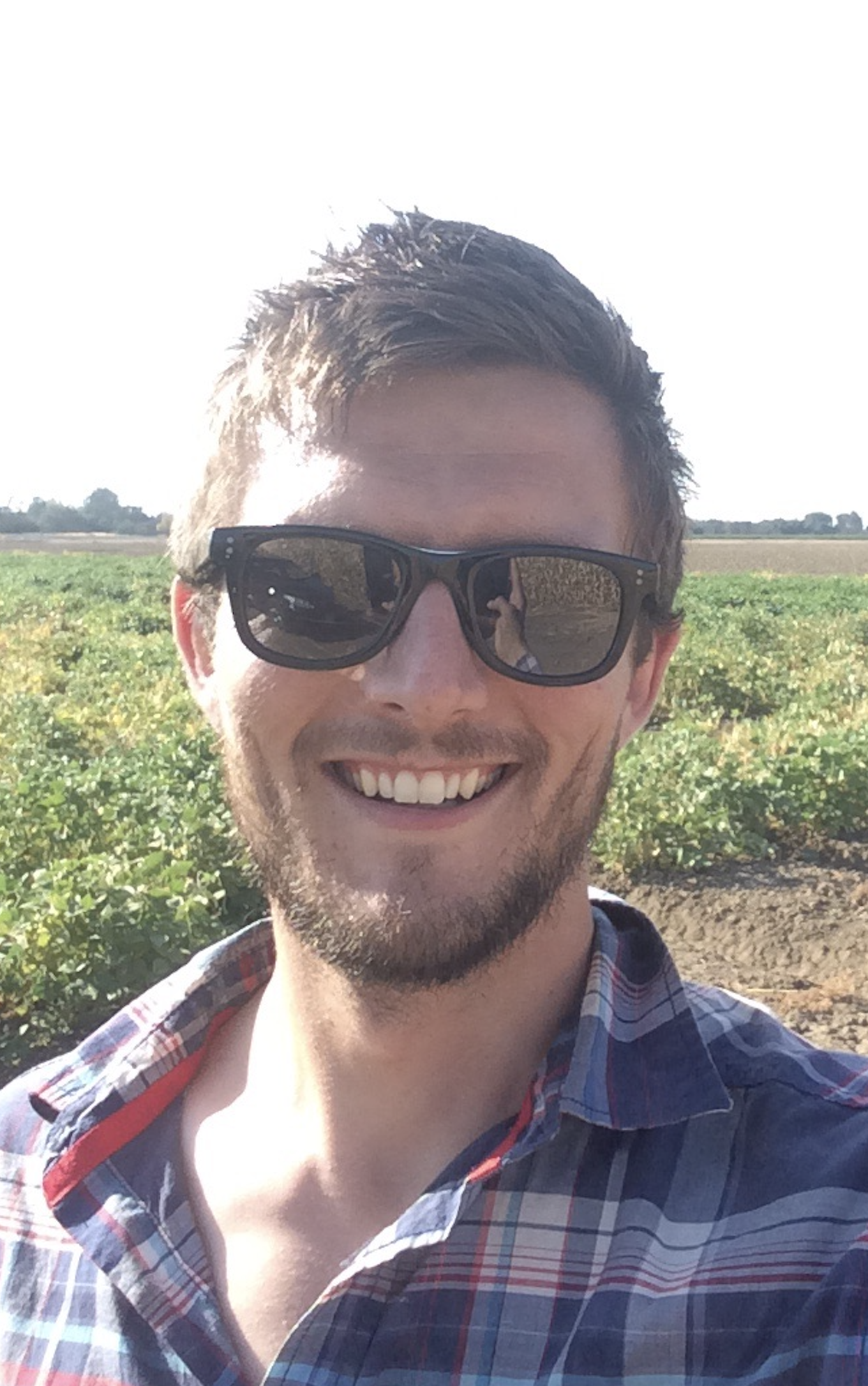
|
Travis Parker – Ph.D. expected 2019Thesis: Genetic evaluation of common bean for California organic productionPI: Paul GeptsParker is interested in making common bean production profitable, especially for organic growers here in California. Unfortunately, few varieties available to growers today combine a) competitiveness against weeds, b) high-yields in the face of pests, diseases, and adverse environmental conditions, c) pod shattering resistance, and d) high culinary/market value. He and his team are working to determine the genetic causes of these traits and deliver varieties that meet consumer and grower demands. Travis was featured in the February 2016 newsletter. |
|
Stefan Petrasch – Ph.D. expected 2020Thesis: Genetics of the Botrytis-Strawberry PathosystemPI: Steve KnappStefan’s research interests lay in plant breeding, especially its combination with molecular biology as well as genetic and genomic approaches. He did his bachelor studies (Biology) at Dresden University of Technology in Germany and his master studies (Plant Science with focus on Plant Breeding and Genetic Resources) at Wageningen University in the Netherlands. For his PhD at UC Davis he is working on the Botrytis-Strawberry pathosystem. The goals are to create a better understanding of the response of strawberry to Botrytis infection as well as the investigation of potential sources of tolerance or resistance that can be applied in plant breeding. |
||
Alan Rodriguez – M.S. expected 2019Thesis: Novel Resistance to Fusarium Wilt in StrawberryI am a masters student in the Knapp lab and my thesis is focused on Fusarium wilt resistance in strawberry. My thesis will specifically focus on using strawberry as a model for resistance gene identification through common gene families associated with pathogen resistance in polyploid crops. My project will involve discovery of novel resistance alleles associated with a recently discovered resistance gene(unpublished), or novel loci conferring resistance to fusarium wilt in strawberry. The goal of this project is to provide the strawberry community with multiple alleles and/or loci that confer innate immunity to fusarium wilt. |
||
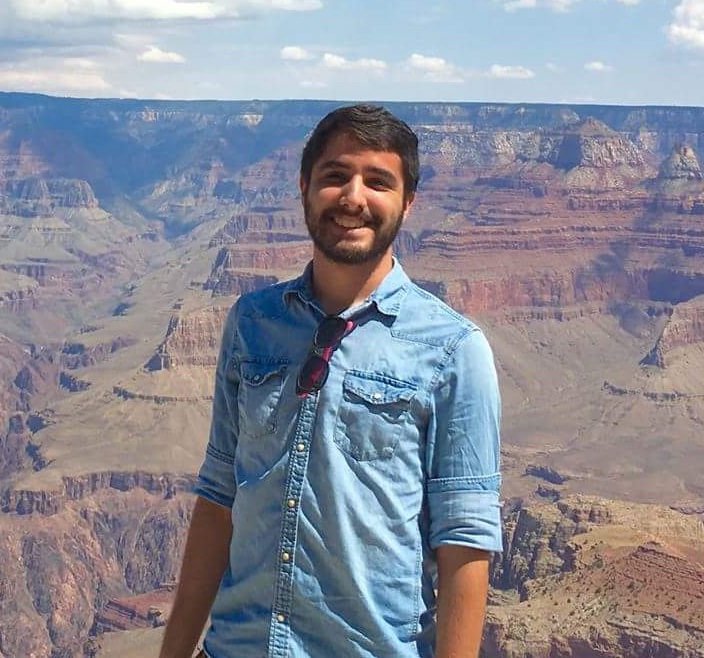
|
Luis Salazar – Ph.D. expected 2022PI: Richard MichelmoreLuis is a PhD student in the Horticulture and Agronomy Graduate Group with a focus on plant breeding and genetics under Dr. Richard Michelmore. He completed his undergraduate studies in plant genetics and environmental horticulture at the University of Florida. His previous research experience involved breeding for improved flavor in tomatoes. He is currently working to understand the genetics of salt tolerance in wild lettuce as a source of improving cultivated lettuce's tolerance to increasing soil salinization. |
|
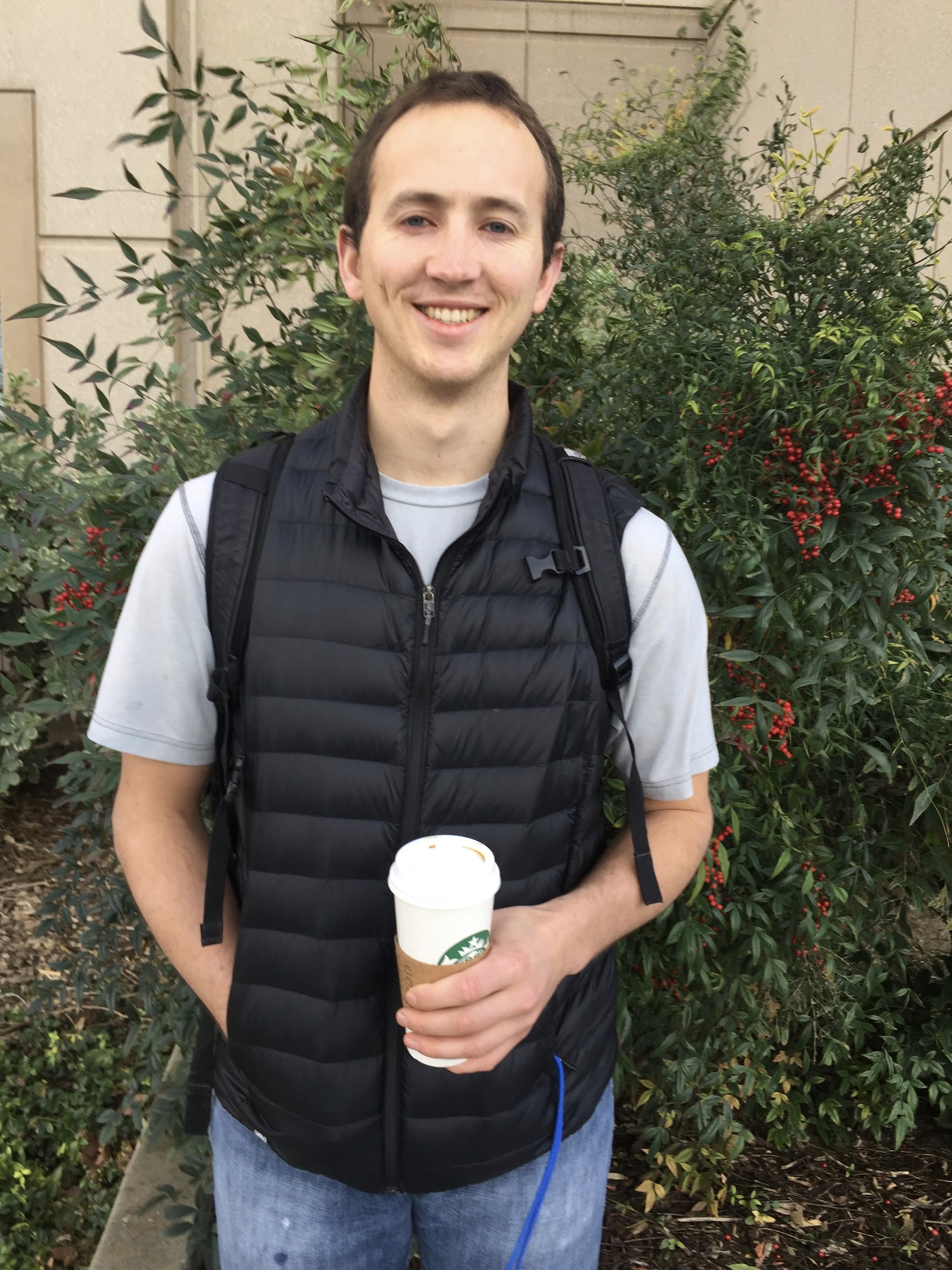
|
Ian Thompson – Ph.D. expected 2019Thesis: Genomic Selection in Melon BreedingPI: Charles BrummerHis research is broadly about examining the potential of genomic prediction to increase the rate of genetic gain in melon breeding, and more specifically to predict hybrid performance within and across macro-environments. |
|
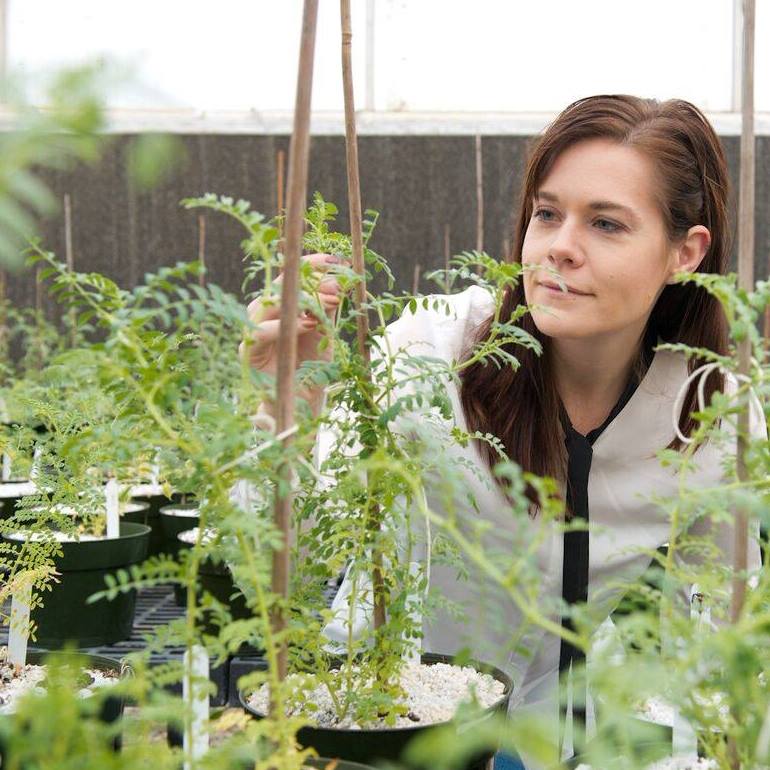
|
Kay Watt – Ph.D. expected 2018Thesis: The Genetic Basis of Terminal Drought Tolerance in Cicer arietinum L.: An Investigation into Geogenetic DiversityPI: Paul GeptsKay became interested in plant breeding while volunteering with the Peace Corps in Panama. Tropical, nutrient-bare clay soils are exceedingly difficult for sustaining crops such as tomatoes, cucumbers, etc. When she returned she decided to change her career, and pursued a BS in Biotechnology at University of Massachusetts, Amherst, followed by her current degree, a PhD in Integrated Genetics and Genomics here at the University of California, Davis. She is a member of the Gepts Lab, and her research concentrates on understanding the genetic component of drought tolerance in chickpeas. Chickpea is a protein-rich, underserved crop that is grown on residual soil moisture in many parts of the world, especially in the semi-arid regions where some of the deepest pockets of rural poverty are located. Her current projects involve subjecting landrace and cultivar varieties to terminal drought in greenhouse and the field. These varieties were chosen based on their origins, focusing on varieties from areas with low rainfall, historically. She is also am working on an interdisciplinary project with the Food Science department, conducting a sensory panel to better understand consumer preference of chickpea taste and texture, which will be incorporated into her future drought breeding projects. Kay was featured in the March 2018 Newsletter. |
|
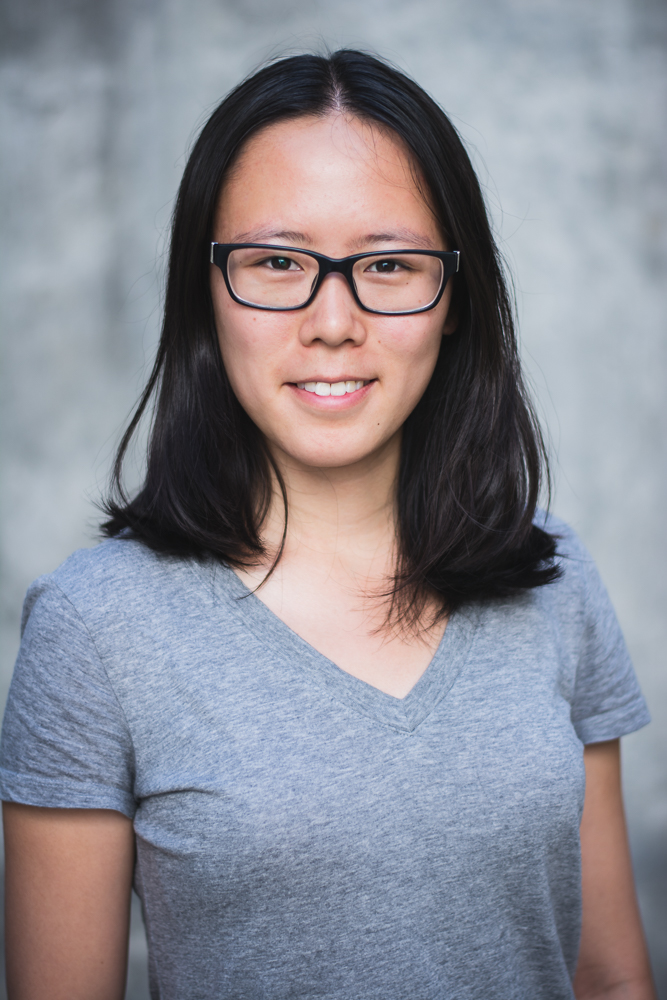
|
Mengyuan Xiao – Ph.D. expected 2019Thesis: Isolation and utilization of primary domestication genes in wheatPI: Jan DvorakXiao is a PhD student in UC Davis Horticulture & Agronomy Graduate Group, working with Dr. Jan Dvorak on wheat evolutionary genetics. She did her undergraduate study in China Agriculture University, majoring in Agronomy. Her graduate research is trying to understand the genetic regulation of wheat domestication syndrome and interpret the findings in the context of wheat domestication and subsequent evolution. She is also participating in the SCOPE pepper breeding project. Mengyuan was featured in the November 2016 newsletter. |
|
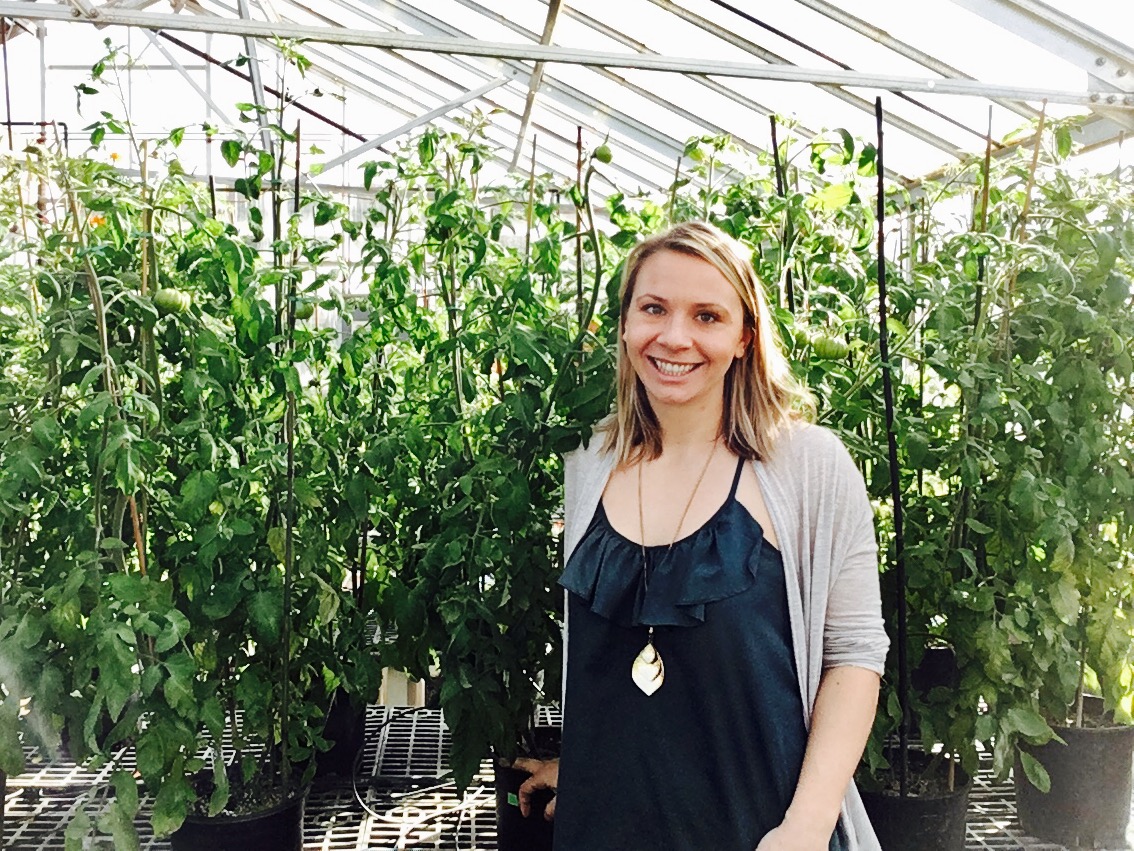
|
Stephanie Smolenski ZulloPI: Dina St. ClairStephanie is a second-year Ph.D. student in the Horticulture and Agronomy Graduate Group, focusing on Plant Breeding and Genetics in Dina St.Clair’s lab. She is studying Plant Breeding and Genetics to learn more about novel methods to improve crop varieties needed to feed an expanding global population. She was interested in studying at UC Davis to learn from and work with some of the most distinguished researchers in the field of agricultural research. In the St.Clair lab, she is fine-mapping a QTL for water stress tolerance in near-isogenic lines of fresh-market tomato. Since nearly a third of all fresh-market tomatoes are grown in California, identifying a QTL that can produce an equivalent yield with a fraction of the water is incredibly valuable. She is also studying the heritability of several fruit quality traits while developing improved heirloom varieties in the Student Collaborative Organic Plant Breeding Education (SCOPE) Project. She hopes to continue working in plant breeding after graduation, and hope to develop new varieties that focus on quality characteristics such as flavor, in addition to traits related to fruit quality and stress tolerance. Stephanie was featured in the February 2017 newsletter. |
